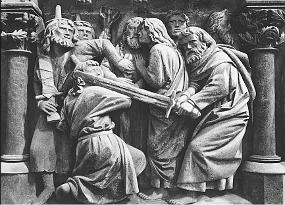 Cerulean Sanctum deals largely with how the American Church lives out what it believes. Where I only occasionally stray is into the theology that undergirds that belief.
Cerulean Sanctum deals largely with how the American Church lives out what it believes. Where I only occasionally stray is into the theology that undergirds that belief.
In crisscrossing the Christian blogosphere, visiting local churches, and viewing Christians posting in social media, I’ve witnessed repeated thought patterns based on “insufficient” theology. Too many statements made by supposed believers lack something essential to well-rounded Christian belief.
While the whole of Christian theology and apologetics encompasses a staggering breadth of topics and issues, I want to stick to three areas of deficiency that continually cripple solid understanding of what it means to be a Christian in the 21st century.
That said, an obvious one must be discussed, too, as well as one that is a “major minor.” But I’ll get to those two later.
First, a declaration. To do this subject justice requires a ton of footnotes and a plethora of Bible quoting. If I put all that in this post, it would end up in the TL;DR pile. So, we’re all adults here: I will leave the study to you. Please do look up these issues in your Bible and confirm them for yourself. I will be writing from the 30,000-foot view. I want to put these ideas out there. You can follow up as you see fit.
The Obvious
The Trinity.
Now you know why I’m keeping this high level. A study of The Trinity could fill 20 posts and still not touch on everything.
By Trinity, I mean God the Father, God the Son (Jesus), and God the Holy Spirit. Three unique, co-existing persons enveloped in one Godhood.
I say with no hesitation that if a church gets The Trinity wrong, everything else is wrong. Stop right there. Do not pass GO. Do not collect $200.
While the word cult raises hackles in a politically correct age, you can separate a genuine, orthodox Christian church from a pseudo-Christian cult 99.999% of the time by how it portrays the unity of the Father, Son, and Holy Spirit. That criterium alone. Seriously.
What does your church believe about The Trinity? How does that square with small-“o” orthodox Christian belief? Find out. Really.
The Three Majors
How a church thinks and how that thinking informs its practice is not something most people ponder. They show up on Sunday, sing a few hymns, listen to someone talk about God, share an awkward handshake or two with some folks they don’t know as well as they should, and they go home.
You don’t want to be that person. You want something more.
I think that more you want hinges on how your church deals with the following three issues:
- Sin
- The Journey of Christ
- The Kingdom of God
These three rise to the top because most people, even Christian leaders, don’t think much about them once they’ve convinced themselves of the basics, especially how teaching and understanding them manifests itself in practice.
Sin
We need to look at sin as two component parts:
- Estrangement from God
- Bad behaviors we do (because of estrangement from God)
Many Christians spend their entire lives managing bad behavior because that’s what their churches teach. The Christian life becomes an endless wrestling against those couple rotten behaviors we can’t seem to overcome.
That’s picking nits, though, and it’s doomed to failure. Constantly monitoring oneself for sin slipping in here or there leads only to despair. And that’s where many Christians are regarding their sin.
In reality, the core problem isn’t sinful behaviors but estrangement from God. The first thing God said to Adam and Eve after the Fall was not “What have you done?” but “Where are you?”
Whenever we talk about sin, the word repentance follows close behind.
Want an interesting exercise? If you have a King James Bible, do a word search in the Old Testament for the word repent.
Not many uses, are there? And usually only related to God changing His mind about something.
Yet the history of God and His People in the Old Testament was a history of God doing what? Asking those people to repent. But if God didn’t use that word, how did He ask? By holding open His arms and longing for His beloved people to walk away from their idols and return to Him. To come Home.
What does biblical repentance that ends estrangement from God look like? Read Jesus’ parable of the Prodigal Son (see Luke 15).
God wants a relationship with us. He wants us to turn from whatever it is that distracts us and come back home to Him. At its core, that’s what repentance truly is.
A funny side effect occurs when that happens. You find it in this classic hymn:
Turn your eyes upon Jesus,
Look full in His wonderful face,
And the things of earth will grow strangely dim,
In the light of His glory and grace.
When it comes to the second half of that sin theology, first dealing with our estrangement from God tends also to diminish greatly our sinful behaviors. The closer we draw to Him after we’ve come home, the less those sins bedevil us. Drawing close to God matters most.
The Bible says this:
And this is eternal life, that they know you the only true God, and Jesus Christ whom you have sent.
—John 17:3 ESV
The problem many churches have with their theology of sin is a focus on managing sinful behaviors rather than a focus on coming home to God and deepening intimacy with Him. Knowing God deep in our very core makes all the difference. THAT is eternal life. If a church does not spend the majority of its time helping us deepen our intimacy with God, then we may forever struggle to manage sinful behaviors.
The Journey of Christ
Ministry –> The Cross –> The Resurrection –> The Ascension/Pentecost
Please note the four component parts of The Journey of Christ. Now realize it is highly likely that a church will not fully teach and minister from an understanding and practice of all four parts equally.
That’s a huge theological deficiency.
The worst part: Most churches and denominations insist they teach and practice it all equally. They don’t, though. Most cherry-pick a place or two in that journey and throw those select few all their time and effort. This diminishes how they frame the Christian life, teach it to others, and practice it.
For instance, it’s easy to see many charismatic churches skip right to the end and spend most of their time living their faith out of The Ascension/Pentecost. Sure, there’s a little talk of the other three parts, but they remain forever secondary. That diminishment skews the way charismatics look at everything. A lack of teaching on The Cross as a means to end the willfulness of the Christian almost never gets discussed. It’s one reason why so little humility exists in some sectors of the charismatic movement.
Many mainline churches jump right to The Resurrection. They talk a lot about new life and clearly perk up around Easter time, but they don’t do as well dealing with the old life and its troubles or with the charismata. The Cross and The Ascension/Pentecost get short shrift.
Likewise, stopping at The Cross with one foot into The Resurrection explains why some of the loudest Reformed voices on the Web get hung-up on sin, talk less about what a new life looks like in full, and rarely venture into The Ascension/Pentecost and what that means for the Church. As a result, you hear a whole lot of sinner and not much saint. Oddly, as much as Reformed and Holiness churches clash in the rest of their theology, they both share this affinity.
It is highly probable that your church and mine do not deal equally with the four parts of The Journey of Christ. Again, leaders will protest this like crazy, but it’s true. Something in that journey is being overemphasized and something under-. It’s a very human failing.
To be a balanced Christian in our theology, we must identify the dearth in our church in regard to The Journey of Christ and supplement from other sources that highlight the underserved part(s) of the path. Those sources will likely fall outside the ghetto of our church or denomination. Because, hey, blinders. Don’t be afraid to step outside your familiar church neighborhood. You will be a more well-rounded Christian if you do.
The Kingdom of God
The Kingdom of God consists of both The Kingdom Now and The Kingdom Not Yet. Jesus brought The Kingdom of God with Him in His incarnation and it persists in the Church (Now) until He comes again and restores everything (Not Yet). Almost every church will insist it believes The Kingdom of God is both Now and Not Yet, but too many of them don’t act as if they do. The Church in America struggles with its teaching and practice of The Kingdom more than almost any issue.
When a church is heavy in Kingdom Now, we see a strong emphasis on ministry to others and on the power to do so. Nothing wrong with believing that The Kingdom manifests in power through the living, dynamic Church. Charismatic churches tend to dwell in Kingdom Now theology.
However, that’s not all The Kingdom is. And this explains why so many charismatics become disillusioned when they assume Kingdom Now, but God is directing them toward Not Yet. We simply will not see every tear dried until Christ returns. We have the Lord’s Supper now, but the Marriage Supper of the Lamb will far, far outstrip it in glory. Kingdom Now folks need to bear this in mind and recall that our ultimate destination is not here and now.
When a church is heavy in Kingdom Not Yet, everything feels delayed until we die and go to heaven. This thinking reminds us of the temporality of this life and the eternity of the life to come, where we will see the fulfillment of everything we hoped for here and now. That’s a good thing.
However, too much Kingdom Not Yet can ignore the present. The Cult of Suffering I see in some Reformed and mainline churches today is a result of thinking only Kingdom Not Yet. That leads to a church that is powerless in the face of current problems, always preaching muddling through rather than any kind of triumph over the vicissitudes of life. Everything positive feels delayed until we see the Pearly Gates. Obviously, that’s a deficient way of looking at The Kingdom and what Christ empowered the Church to be and do this side of heaven.
The Kingdom is both Now and Not Yet. We must live and believe both parts fully to have a fully realized faith.
The Major Minor
How Christians view The Atonement of Christ, while a major aspect of our theology, runs under our radar and is therefore often assumed rather than understood. Pastors know which type of atonement theory they teach and preach, but most people in the seats can’t distinguish Penal Substitution from Christ Victor, much less define them.
By The Atonement, we mean what Jesus accomplished for us by His death on the cross. Many theories exist for what happened in Christ’s sacrificial act. Theologians will defend their particular favorite theory almost to the death and to the point of calling anyone who doesn’t share their singular belief a heretic.
I find that ludicrous. I look at the many Atonement theories and each has something interesting to say about the breadth of Christ’s finished work that I can see the Bible validating. Excluding all other theories to the acceptance of one alone is unwise, in my opinion. While YMMV, I believe we should familiarize ourselves with the many theories and use them as a means to widen our understanding of the enormity of Christ’s Atonement. This can only lead to a greater appreciation for all Jesus did for us.
Like the three Majors listed above, what we think about The Atonement will flavor what we believe about the Christian faith and how we manifest it…
…BUT…
…so will many other aspects of Christian theology. Our eschatology, how we view the End, factors into how we live now. As does our soteriology, what we believe about how Jesus saves. And many other -ologies within our theology. All have importance. All will lead us to the expression of the Faith we believe and show to the world.
Still, each of us must ask how our churches and denominations bend our beliefs and practices in one direction or another. Because the direction we do not go is likely valid, too, and when we skip it, we may just find ourselves believing and living a less-than-optimal Christian life.

 Recent world and national events have brought increased attention to issues of the right to bear arms and of personal defense. These important issues deserve discussion.
Recent world and national events have brought increased attention to issues of the right to bear arms and of personal defense. These important issues deserve discussion. They look to find someone who loves his enemies.
They look to find someone who loves his enemies.